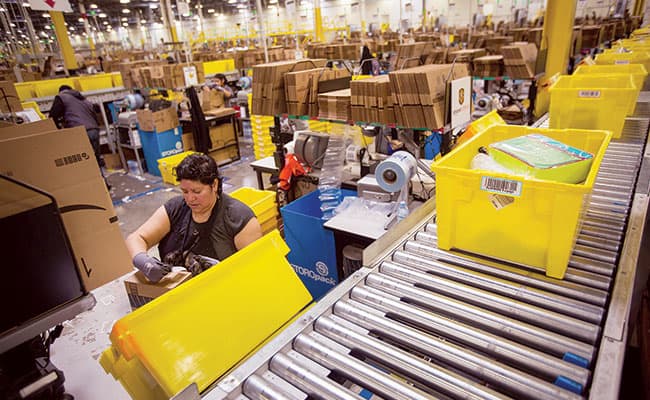
Kevin Vazquez is a staff attorney at the International Brotherhood of Teamsters. He graduated from Harvard Law School in 2023. The opinions he expresses on this blog are his own and should not be attributed to the IBT.
Across the Midwest and South, communities were left to dig through wreckage and rubble this weekend after a rare winter tornado outbreak – some traveling more than 200 miles – wrought a wide swath of devastation from Missouri through Kentucky on Friday night. In Illinois, at least six Amazon workers were killed – and an unknown number remain missing – after a direct hit from a tornado caused the warehouse in which they were working to partially collapse. It is unclear how many workers are still trapped in the debris, but emergency service and government officials have said that efforts have shifted from “search and rescue” to “search and recover,” suggesting that there are no survivors remaining – and that the official death count might continue to rise. Hours after news of the deaths broke, Jeff Bezos said that he was “heartbroken” by the “loss of our teammates” in Illinois – but not before first taking time to celebrate his space company Blue Origin’s latest celebrity rocket launch as emergency responders searched for bodies. Amazon has received criticism not only for compelling its workers to return to work amid the sirens of tornado warnings but also for banning phones on the warehouse floor, which likely meant that workers were unaware of emergency weather warnings as the tornado approached. Moreover, meteorologists suggest that climate change was likely a major contributor to the ferocity and scope of the extraordinary December tornado outbreak, and, as this year’s World Inequality Report pointed out, Bezos’s own nine-minute joyride to the precipice of the great beyond emitted as much carbon into the atmosphere as one billion of the poorest people emit in their entire lifetimes.
On Saturday, a Senate panel released an updated proposal of the budget reconciliation bill that, following the passage of the infrastructure bill into law last month, constitutes the second, more ambitious portion of President Biden’s domestic agenda. The proposal contains, among other provisions, increased funding for labor enforcement – including a provision permitting the NLRB to impose civil monetary fines on employers who violate labor law. The package provides the NLRB with the authority to impose $50,000 civil penalties for violations of the NLRA, which could be doubled under some circumstances. The proposal also includes $350 million for the NLRA, $321 million for the EEOC, $405 million for the DOL’s Wage and Hour Division, $201 million for the OFCCP, and $707 million for OSHA, and it allocates additional funding for workforce development agencies. Pres. Biden, as the Wall Street Journal noted on Saturday, appears to be placing union support at the center of his agenda, aiming to stymie the gradual gravitation of many rank-and-file union members towards the Republican Party.
On Friday, the Supreme Court announced that it will consider whether a Southwest Airlines cargo ramp supervisor should be considered a transportation worker involved in the flow of interstate commerce and thus exempt under §1 of the Federal Arbitration Act, which would permit her to bring her overtime claim in court despite a mandatory arbitration provision in her employment contract. The FAA exempts “seamen, railroad employees, or any other class of workers engaged in foreign or interstate commerce,” which the Supreme Court construed very narrowly in Circuit City Stores v. Adams in 2001 as including not all employment contracts but only those concerning workers actually engaged in the transportation of goods in interstate commerce. In March, the Seventh Circuit held that the Southwest employee was exempt from the FAA as engaged in interstate commerce because her job duties included transporting cargo across state lines, echoing, in some ways, the Ninth Circuit’s 2020 opinion in Rittman v. Amazon, which exempted Amazon’s “last mile” AmFlex delivery drivers from the FAA under §1 even though the drivers themselves did not cross state lines, permitting them to bring their FLSA and state-law claims against Amazon in federal court. The Supreme Court’s fealty to private arbitration agreements, however, as demonstrated in its modern FAA jurisprudence, might not bode well for the worker’s claim.
Finally, over the weekend, President Biden released a statement supporting the striking Kellogg’s workers and condemning the company’s efforts to replace them with permanent workers, which Fred explained for OnLabor on Friday. Biden’s statement was a very rare presidential reprimand of a private employer during a strike. “Collective bargaining is an essential tool to protect the rights of workers that should be free from threats and intimidation from employers,” his statement read. “That’s why I am deeply troubled by reports of Kellogg’s plans to permanently replace striking workers,” which is “an existential attack on the union and its members’ jobs and livelihoods.” He also said he “strongly supports” legislation banning the permanent replacement of striking workers. Whether this rhetoric will translate into action remains to be seen, but, in any event, his strongly supportive statement is a welcome break from the typical mode of presidential intervention in ongoing labor disputes.
For those interested in a longer weekend read, a Saturday Washington Post piece details the failed UFCW campaign at a Connecticut Dollar General in October. Through a detailed exploration of the lives of the workers who spearheaded the campaign, it illustrates many of the themes that animate modern labor organizing – such as desperation, low-wage work, instability, and insecurity, all playing out amid a backdrop of poverty, inequality, and deindustrialization – but also demonstrates the hope, opportunity, solidarity, and strength offered to ordinary workers by unions and the labor movement. It is a bleak but profoundly inspiring article.






Daily News & Commentary
Start your day with our roundup of the latest labor developments. See all
November 20
Law professors file brief in Slaughter; New York appeals court hears arguments about blog post firing; Senate committee delays consideration of NLRB nominee.
November 19
A federal judge blocks the Trump administration’s efforts to cancel the collective bargaining rights of workers at the U.S. Agency for Global Media; Representative Jared Golden secures 218 signatures for a bill that would repeal a Trump administration executive order stripping federal workers of their collective bargaining rights; and Dallas residents sue the City of Dallas in hopes of declaring hundreds of ordinances that ban bias against LGBTQ+ individuals void.
November 18
A federal judge pressed DOJ lawyers to define “illegal” DEI programs; Peco Foods prevails in ERISA challenge over 401(k) forfeitures; D.C. court restores collective bargaining rights for Voice of America workers; Rep. Jared Golden secures House vote on restoring federal workers' union rights.
November 17
Justices receive petition to resolve FLSA circuit split, vaccine religious discrimination plaintiffs lose ground, and NJ sues Amazon over misclassification.
November 16
Boeing workers in St. Louis end a 102-day strike, unionized Starbucks baristas launch a new strike, and Illinois seeks to expand protections for immigrant workers
November 14
DOT rule involving immigrant truck drivers temporarily stayed; Unions challenge Loyalty Question; Casino dealers lose request for TRO to continue picketing